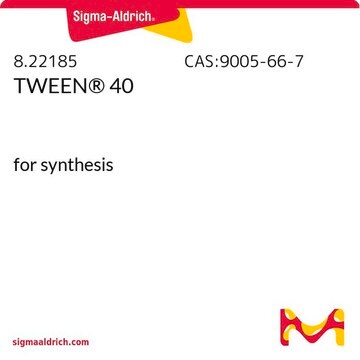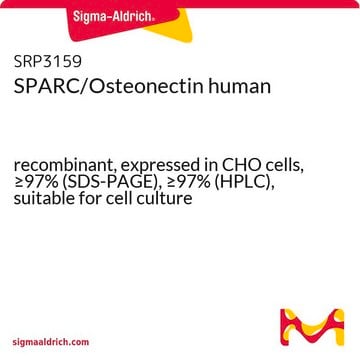STS0201
ECO TWEEN® 40
viscous liquid
Synonym(s):
TWEEN® 40, Polyoxyethylenesorbitan monopalmitate
About This Item
Recommended Products
description
non-ionic
Quality Level
assay
~90.0% (GC)
form
viscous liquid
mol wt
estimated mol wt 1277
composition
Palmitic acid, ~90.0% (balance primarily stearic acid)
greener alternative product characteristics
Use of Renewable Feedstocks
Design for Degradation
Learn more about the Principles of Green Chemistry.
sustainability
Greener Alternative Product
CMC
0.027 (20-25°C)
solubility
water: 100 mg/mL, clear to slightly hazy, faintly yellow
HLB
15.6
greener alternative category
, Aligned
SMILES string
O1C(C(C(C1)OCCO)OCCO)C(OCCO)COCCOC(=O)CCCCCCCCCCC
InChI
1S/C26H50O10/c1-2-3-4-5-6-7-8-9-10-11-24(30)34-19-18-31-20-22(32-15-12-27)26-25(35-17-14-29)23(21-36-26)33-16-13-28/h22-23,25-29H,2-21H2,1H3
InChI key
HMFKFHLTUCJZJO-UHFFFAOYSA-N
Looking for similar products? Visit Product Comparison Guide
General description
Application
Features and Benefits
- 100 % Renewable
- 100 % Bio-based
- Certified to the USDA BioPreferred Program
- Lower carbon footprint than petrochemical-based versions
- High-purity chemical suitable for a wide variety of research applications
Other Notes
Legal Information
Storage Class
10 - Combustible liquids
wgk_germany
WGK 1
Choose from one of the most recent versions:
Certificates of Analysis (COA)
Don't see the Right Version?
If you require a particular version, you can look up a specific certificate by the Lot or Batch number.
Already Own This Product?
Find documentation for the products that you have recently purchased in the Document Library.
Our team of scientists has experience in all areas of research including Life Science, Material Science, Chemical Synthesis, Chromatography, Analytical and many others.
Contact Technical Service







